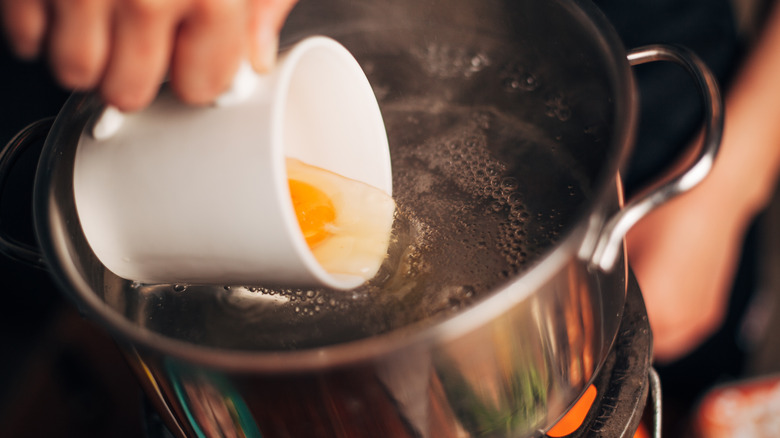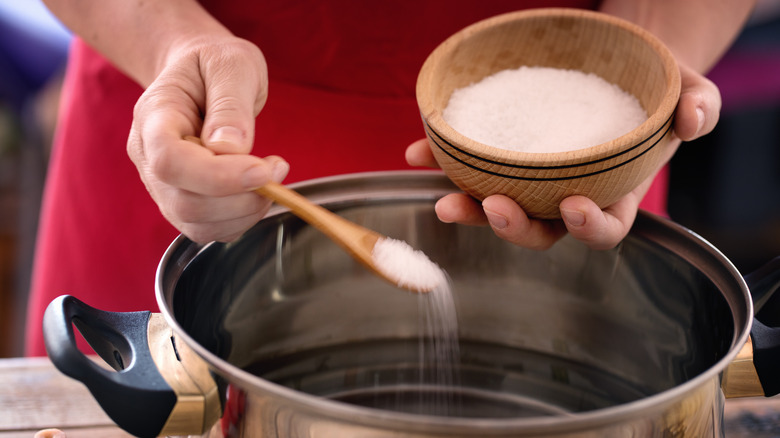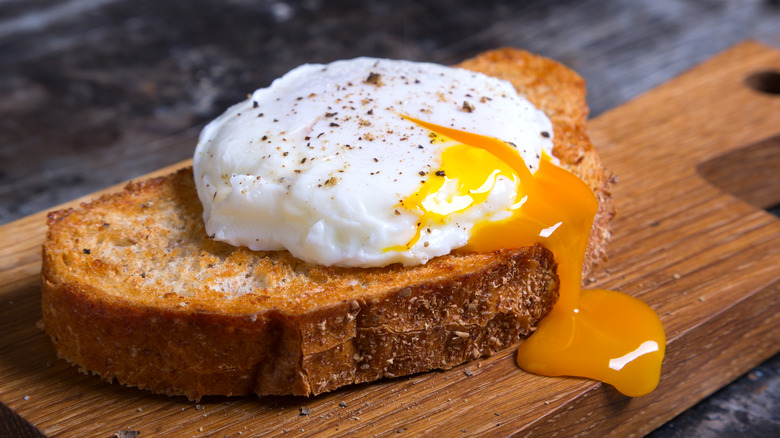Why You Should Season Poached Egg Water Like You Would For Pasta
Poaching eggs at home is an elegant and impressive culinary skill. It's also an intimidating one. As such, just like any other finicky cooking method, chefs and experts have come up with quite a few tricks and tips to help you make the best version. Though you'll need to practice to figure out your own routine, there is one piece of advice that can make a big impact: Season your poached egg water with salt.
Neglecting to do so is actually one of the mistakes everyone makes with poached eggs. If you treat the liquid as you would pasta water, and add salt before tipping your cracked eggs into the pot, it'll net the best results. Just know that you don't need your liquid to be as salty as the sea — anywhere from a pinch to a teaspoon will do.
Adding salt serves two purposes. First, it adds depth of flavor to your meal. And second, it changes the density of the water, encouraging cooked eggs to float to the surface when they're ready to serve. This makes it easier to scoop and to serve the finished orbs.
Salt's effect on poaching liquid
One challenge of cooking eggs is that they tend to sink to the bottom of the pot. But adding salt changes the density of water. Though chefs only use a small amount, rather than working to achieve an ocean-like brine, the addition should have enough of the impact on the bubbling liquid to encourage cooked eggs to rise. The combination of salt and vinegar can also encourage the whites to firm up, helping the eggs cook more evenly.
The added salinity can gently boost the taste of the dish, as well. The results might be more subtle than when cooking pasta, as the eggs may spend just a short time in the water, so you'll still want to round out the dish by finishing with a sprinkle of salt. But most recipes suggest seasoning ingredients early and often, and it stands to reason this idea will benefit the poached protein, too.
Some people argue that the salt has a detrimental effect, causing more ribbons of white albumen. If you're concerned about this, a savvy trick to reduce wisps and feathering is to crack eggs into a fine mesh strainer to allow the watery parts of the egg white to drip away. You can even start cooking the egg in the strainer to control the shape. Doing so should end up with a neater poached protein without sacrificing seasoning.
The best ways to season poached eggs
Once you've got the hang of poaching eggs in seasoned water, consider expanding your approach to include other flavorings and spices. For the greatest visual effect, try adding turmeric to the boiling liquid. In addition to imbuing a warming flavor, a teaspoon or two of the vibrant powder will tint the whites a striking golden color. You can also take a French-inspired approach by adding a glug of red wine to your water to stain the protein and add a subtle tang.
For a more savory approach, try using stock as the base of your boiling liquid. The salted broth will cook flavor into the exteriors and can be repurposed as a soup to serve alongside your runny eggs. Or, on the flip side, you can build a sweet-savory brunch sandwich by poaching eggs in maple syrup.
If you're hoping to penetrate more of the egg itself, you can spice before you cook. Some chefs take the time to rest eggs in a mixture of vinegar and water to set the exteriors before they cook, but you can take things a step further by seasoning the mixture with salt and other spices. Think about the dish you'll be serving the egg with as you incorporate your spice blend.



